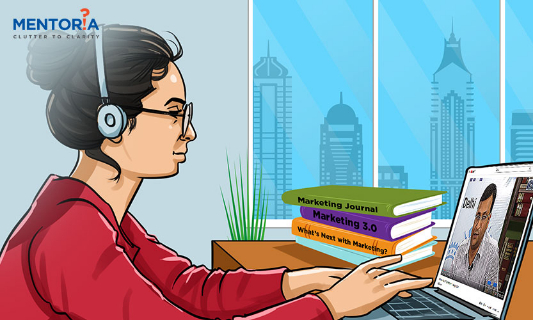Here’s Why Successful People Never Stop Learning

There was a time, before the internet era, when starting your career meant joining a company – usually at the entry level, and then working your way up through experience gained on the job. There are many examples of those who have gone from the shop-floor to become CEOs of their companies. One didn’t really bother with what a colleague in another department or another part of the world was doing unless your work required it as life used to be more of a learning process. Most of the successful people did well and achieved excellence in what they did over a period of 20 or 30 years.
Two decades into the 21st Century, we find that we live in an extremely inter-connected ecosystem. Personal development in examining your life objectives and values and developing your abilities and attributes to reach your full potential, has become a challenge. Setting goals for oneself and working toward them has become increasingly important as new technologies and applications alter our interactions with the world and people.
Machine Learning, Customer Experience, Social Media, Internet of Things, Cloud Computing and multiple other terms have come into our common daily usage over the last 20 years or so. Some of the companies and jobs that we commonly talk about today, did not even exist some years ago!
At Mentoria, we understand that figuring out your career in a constantly changing world can be overwhelming. That’s why we’re dedicated to making the process as easy and intuitive as possible for you! Discover more about the Mentoria Solution here:
In this dynamic and constantly changing environment, we cannot ignore the developments around us. Technology is becoming all-pervasive and impacting various job environments.
While not everyone is required to be a software developer, it is imperative that everyone understands these technological developments. This gives them a good idea of how their work will be impacted and how technology can be leveraged to better their work.
In this context, let’s look at 4 critical reasons why you should never stop learning:
1. Jobs and job roles as we know it are changing

The World Economic Forum Human Capital Outlook Report, predicts that “Disruptive changes to business models will have a profound impact on the employment landscape over the coming years.” The same report estimates that “65% of children entering primary school today will ultimately end up working in completely new jobs that don’t yet exist.”
The job landscape as we know it is being shaped by the trends and technological advancements that are happening on a continual basis. Tasks which are monotonous or inherently risky, are being done by Robots; e-Commerce companies are looking to use drones for delivering products to end-customers; Voice dictation software makes the job of a typist redundant; Self-driving vehicles are expected to reduce the rate of accidents, doing away with the need for human drivers; and there are many more such examples.
In the past, companies relied on Business Intelligence (BI) Professionals to make sense of the data being generated. With the massive volume of data that most large organisations are generating today, you need more than just one person looking at the data. You would need a Big Data Analyst to understand the data. A Business Intelligence Analyst to understand help make business decisions, a Data Science Analyst to predict future trends, etc.
2. Changing technology impacts the nature of jobs

Advances in technology – especially Artificial Intelligence (AI) and Robotics, are playing a dominant role in transforming the work scenario as this article reports. All of us have interacted with a Customer Service Representative (CSR) at some point. This role has already been transformed by the introduction of Interactive Voice Response (IVR) which handle most of the routine queries. Now we see Chatbots interacting with visitors on a website and answering many of the basic questions.
In this presentation by Sundar Pichai – CEO Google, we see how Google’s AI Assistant can actually ring up a salon or a restaurant to make an appointment for you! This part of a personal secretary’s job can be handled by an AI Assistant.
As organisations adopt new technology to keep up, you will need to adapt in order to stay relevant. The key to this is to leverage the technology or tool and use it effectively in your work and in the process help your organisation achieve its goals.
3. Be ready for a new job or career

“When you’ve got 10,000 people trying to do the same thing, why would you want to be number 10,001?” – Mark Cuban (American Investor)
Differentiation! In marketing and economics, this is a key process that sets a product or service apart from hundreds of other similar products or services.
It is important that we demonstrate some quality or expertise or skill that differentiates us from others in our field. It is not necessary for the skill to be currently required by your organisation. It could be an area that your company may get into in the future, or it may be a skill that can get you a new job with another organisation.
I am reminded of an experience in the late 90s at one of my earlier organizations. This was the time when Java Programming Language had just been introduced and was becoming popular, but our organisation did not have any projects in Java. When the Delivery Head inquired with the managers, there was only one person who had prior knowledge of Java. This distinctly set him apart from the others and he went on to manage the first Java project for the organisation.
We at Mentoria know that the career journey is anything but straightforward. That’s why we offer career counselling at any point during your career. Our 4-step career guidance solution, helps us find the right career fit for you from 3 streams, 850+ courses & 12,000+ careers.
4. Keep your brain agile

It is a fact that keeping the brain active through learning, leads to new synaptic connections between the neurons. Continuous learning also helps keep the brain sharp and useful as we age. The brain is like any other organ of the body – with regular exercise and use, the neural connections become stronger – with disuse, they weaken and die.
Have you learnt something totally new recently, such as – a new language, a musical instrument, a new programming language, or a new concept in your field? If not, then now is the right time to do so. There are many resources that you can tap into to make learning a regular part of your professional life.
MOOCs (Massive Open Online Courses) are a great source for up-skilling. Coursera, DataCamp, edX, NPTEL, Udacity are a few of the popular ones. Take up a course of study that can complement your knowledge and skills. Apart from online courses, you can also consider classroom or distance courses from reputed institutions. You can attend these courses at your discretion. Many organisations even sponsor their employees for training provided it is of immediate benefit to the organisation. Look into any training your organisation is holding and get into it.
Another source of knowledge is the blogger community. These are people who dedicate themselves to keep track of specific technologies, or industries or jobs. They share their thoughts and insights through blogs and other social media channels. Many of them are acknowledged as experts in their field. It’s a good idea to subscribe to their blogs and other social media channels such as Facebook, Twitter and Instagram to receive regular updates on what’s happening in your field.
These are but a few of the ways in which you can keep updating your knowledge. The important thing is Keep Learning, and you can look forward to a productive and fulfilling professional career.
Looking for more knowledge? Check out Mentoria’s Knowledge Gateway! We’ve got a whole career library with tips and advice on a number of careers across different fields as well as webinars from industry professionals. Sign up to Mentoria and get lifetime access to the the Knowledge Gateway! Discover more here:






